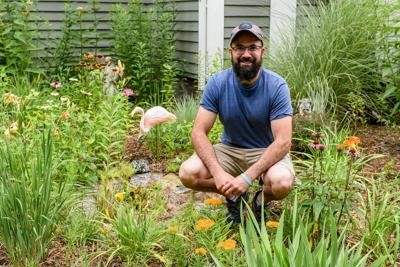July 13
For garden expert, nothing beats authentic
- By Dustin Luca | Staff Writer |The Salem News| July 13, 2022

Matthew Martin crouches down among plants in his garden. Martin hosts an award-winning, nationally recognized podcast called "The Native Plant Podcast" and is dedicated to sustainable gardening by using native plants.
JAIME CAMPOS/Staff photo
WENHAM — With a manmade bog slowly creating peat at home, a patch of purple carnivorous pitcher plants to devour pests (but not pollinators) and towering milkweed to round it out, local horticulturalist Matthew Martin says his property is the quintessential New England garden.
That's because everything in his New England garden is... well... from New England.
"These plants — these native plants — tend to be a lot more adapted to our ecosystem. That usually means less water, less pesticides," Martin said. "You can use the same principles I learned at Disney World or the Arnold Arboretum. One of the reasons why that's so important is because a lot of our ecosystem has vanished. Even our forests aren't biodiverse anymore."
... Back up. Did he say Disney World?
Today, Martin is a 38-year-old Wenham resident who has taken a passion for restoring plant life to a national platform of awareness as co-host on a podcast called "The Native Plant." He also lives on Arbor Street.
"It's just a great name," he said, laughing.
The idea of horticultural restoration is easy to describe: With natural insect and bird behavior shifting due to climate change and unprecedented drought issues drying up water tables and riverbeds, the plants that New Englanders plant need to be considered, according to Martin.
For example, that dreaded ginkgo tree that explodes with breathtaking shades of orange each fall, or any of other countless species that can survive and look awesome in New England but didn't evolve alongside the native wildlife. Many use water differently (as in, too much) or don't support local wildlife nearly as well (if at all).
The ginkgo "is a beautiful tree, but it doesn't support the caterpillars," Martin said. "Without those caterpillars, you aren't going to have the birds."
And yes, some native caterpillars cause damage. But balance the damage with the potential for growth, Martin suggested: "Baby birds don't eat seeds or fruit. They eat caterpillars. They need the soft, fleshy material."
It's an idea that centers around planting what fits for an environment, a lesson Martin picked up as a horticulture intern at Disney World.
While working on a degree in plant science and horticulture from North Shore Community College, Martin took part in internships with Harvard University's Arnold Arboretum, and as a gardener at the country's largest theme park.
At Disney, everything a gardener does focuses on creating an experience through plants, Martin explained. Not only must plants survive the wear and tear of tourists pinching and grabbing at them all day, but they also must blend in, he explained. Gardening often became the method for hiding trash cans or making interior spaces seem bigger than they really were.
"It's a lot of optical illusions and things like that," Martin said. "I learned a lot about planting tough plants, and also trying to create different sections of the park — the lion habitat and what grows in that, or the tiger habitat that has a lot of grasses."
Greener home isn't built in a day
These are all things that Martin said local residents — renters included — can be doing at home. The conversion could be as simple as reading up on native plant species and dedicating a couple feet of lawn to planting native plants... and then each year, dedicating another couple feet, slowly improving local biodiversity.
"Overall, the majority of our landscapes... they should be drought-tolerant. They should be helping wildlife and, of course, they should be beautiful," Martin said. "A lot of our native plants are beautiful.
"It's the message of the Native Plant podcast," Martin continued. "If each person could do their part, even if they don't own land but maybe have a patio... you can plant a milkweed plant in a pot on your patio, and you can help the butterflies.
"If you plant it, they will come," he said, "and some of the wildlife that comes is so cool."
For episodes of the podcast and to hear Martin, visit nativeplantpodcast.com.
